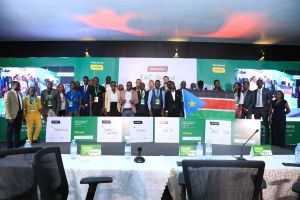In January 2022, the East African Community (EAC), through the “Digital Skills for an Innovative East African Industry” (dSkills@EA) project, launched a campaign dubbed the “Digital Innovations for Business Resilience in the EAC”. The campaign supported young innovators at universities in the EAC to turn their ideas into market-ready digital solutions for business resilience in times of COVID-19.
The initiative follows the fact that the pandemic presented the global and regional business landscape with enormous challenges. Therefore, the campaign addressed the urgent need for digital competencies and digital solutions in the market. It was implemented by StartHub Africa on behalf of the Inter-University Council of East Africa (IUCEA) and Deutsche Gesellschaft für Internationale Zusammenarbeit (GIZ) through the project dSkills@EA.
To start the campaign, hackathons and bootcamps took place across the six EAC Partner States Burundi, Kenya, Rwanda, South Sudan, Tanzania, and Uganda. This way, young innovators at universities were presented with an opportunity to showcase their digital solutions to challenges that are faced by their communities. Over 1,000 applications were received.
During the month of April, top ten teams emerged from each Partner State at the national pitch event series, being selected for the next round of pitches that would gain them a ticket to the Grand Finale. The winning teams at the national pitch events, twelve in total, each received USD 1,000 as prize money, being awarded by IUCEA.
After months of intense bootcamps, training and coaching, twelve finalists made it to the Regional Grand Finale, a culmination of the campaign, that took place online and hybrid on 26 May 2022 in Kampala, Uganda. It brought together the finalists with an audience comprised of innovation experts, the business community and startup associations as well as the academic sector.
Five teams emerged as overall winners, receiving a total of USD 10,000 as an equally shared grant award. They were chosen by an expert jury that looked at the business potential of the finalists’ idea as well as the social impact, job creation, digital innovativeness, impact, adaptation and resilience, and overall, the quality of their pitch. The winning teams are: Nileboda (South Sudan), Kawu (Uganda), Stofresh (Kenya), Smart Water (Rwanda), and BEYI Group (Rwanda).
“The last six months have been very defining to our journey. What started out with the call to apply for this great initiative saw us turn our idea into an investor-ready business. We met mentors who turned out to be friends and stakeholders who helped us all along the way”, highlighted Charles of Stofresh (Kenya). Kenyan-based Stofresh Farmers gives smallholder farmers access to shared cool storage facilities and a market platform using USSD technology while developing a sales commission model for vendors on the online platform.
NileBoda, a South Sudanese ride-hailing startup giving passengers easy and quick access to motorbikes while providing an opportunity for young people to lease motorbikes as riders through an asset financing program.
Kawu from Uganda addresses the challenge of seamless money transfer, facilitating safe savings and monitored expenditure amongst students and their parents Kawu smart cards, provides parents and guardians an easy alternative to pocket money transfer to students, while enrolling school’s staff as money transfer agents.
Smart Water Meter innovation from Rwanda, monitors water consumption and predicts water demand by households, through its digital water monitoring platform. The smart water meter is installed in households providing real-time notification on water usage and a dashboard for water management.
From Rwanda yet again, BEYI Group’s solar powered innovation reimagines reduced labor costs and farm efficiency in rice planting helping farmers avoid losses caused by traditional planting methods.
During the Grand Finale, GIZ Project Director, Mr Simon Hochstein, pointed out: “Together with the EAC, GIZ is working to support young innovators in the EAC to acquire the necessary entrepreneurial and innovation skills to support the digital transformation of the EAC region. This campaign contributed towards this goal.”
The IUCEA Executive Secretary, Prof. Gaspard Banyankimbona, also noted: “As IUCEA, we believe programmes such as the Digital Innovations for Business Resilience in the EAC facilitate building of strong academia-industry partnerships, create strong interface between knowledge acquisition and knowledge utilization, and provide an avenue for mobilizing investments to support and sustain a complete cycle of transforming knowledge into resources.”
The East African Business Council (EABC) was the partner in this initiative, bringing in the perspectives and needs of businesses. More detailed information about the programme, all finalists and their startups can be found on www.dskills.iucea.org.
About dSkills@EA
Digital Skills for an Innovative East African Industry (dSkills@EA) Project is part of the technical development cooperation between the German Government under the German Federal Ministry for Economic Cooperation and Development (BMZ) and the East African Community (EAC) and the EAC Secretariat. The project has established the Centre of Excellence for ICT in East Africa (CENIT@EA) and is implemented by the Inter-University Council of East Africa (IUCEA) and the Deutsche Gesellschaft für Internationale Zusammenarbeit (GIZ), together with the German Academic Exchange Service (DAAD), the East African-German academic consortium led by the Nelson Mandela African Institution of Science and Technology (NM-AIST) and the University of Oldenburg (UOL) together with its partners the University of Dar es Salaam (UDSM), the University of Technology and Arts Byumba (UTAB), the University of Applied Sciences Mannheim and the German Aerospace Center (DLR). Further key partners include the East African Business Council (EABC), the East African Science and Technology Commission (EASTECO) and the East African Telecommunications Organization (EACO).
